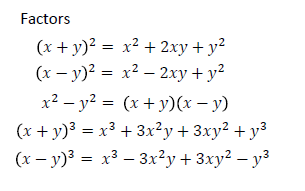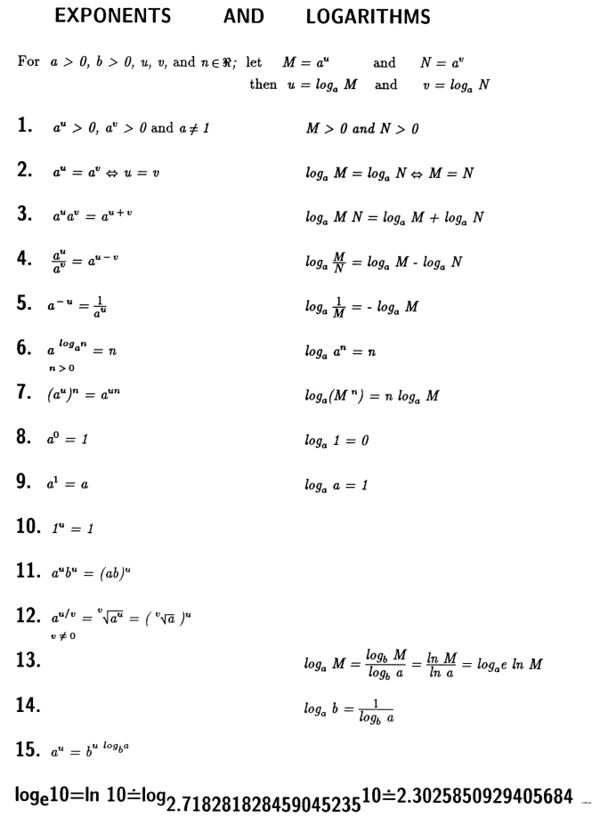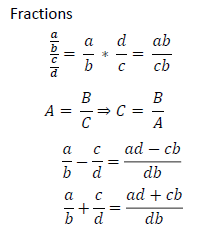Mathematical Identities
Mathematical Identities
Wikipedia Article[1]
Perfect Square: A number, whose square root is an integer. Example: 1, 4, 16, 25.
Substitution (Quantitative Comparisons): When substituting in quantitative comparison problems, don’t rely on only positive whole numbers. You must also check negative numbers, fractions, 0, and 1 because they often give results different from those of positive whole numbers. Plug in the numbers 0, 1, 2, –2, and 1/2, in that order.
Contents
Derivatives
|
|
| Differentiation Rules | |||||
|---|---|---|---|---|---|
| Constants and Single Variables | |||||
| Rule | Name | Rule | Name | Rule | Name |
| $$\frac{d}{dx}c=0$$ | Constnat | $$\frac{d}{dx}x=1$$ | $$\frac{d}{dx}cx=c$$ | ||
| $$\frac{d}{dx}x^{n}=nx^{n-1}$$ | $$\frac{d}{dx}c^{x}=(\ln c)c^{x}$$ | $$\frac{d}{dx}(\ln x)=\frac{1}{x}$$ | |||
| $$\frac{d}{dx}e^{x}=e^{x}$$ | |||||
| Functions | |||||
| Rule | Name | Rule | Name | Rule | Name |
| $$\frac{d}{dx}cu=cu^{'}$$ | $$\frac{d}{dx}(u\pm v)=u^{'}\pm v^{'}$$ | Distributive | $$\frac{d}{dx}uv=uv^{'}+vu^{'}$$ | Product | |
| $$\frac{d}{dx}\frac{u}{v}=\frac{vu^{'}-uv^{'}}{v^{2}}$$ | Quotient | $$\frac{d}{dx}u^{n}=nu^{n-1}u^{'}$$ | $$\frac{d}{dx}\left | u \right |=\frac{u}{\left | u \right |}u^{'},u\neq 0$$ | ||
| $$\frac{d}{dx}\ln u=\frac{u^{'}}{u}$$ | $$\frac{d}{dx}e^{u}=e^{u}u^{'}$$ | $$\frac{d}{dx}\log_{c}u=\frac{u^{'}}{(\ln c)u}$$ | |||
| $$\frac{d}{dx}c^{u}=(\ln\:c)c^{u}u^{'}$$ | $$\frac{d}{dx}f(g(x))=f^{'}(g(x))g^{'}(x)$$ | Chain Rule | |||
| Trigonometry | |||||
| Rule | Name | Rule | Name | Rule | Name |
| $$\frac{d}{dx}\sin u=(\cos u)u^{'}$$ | $$\frac{d}{dx}\cos u=-(\sin u)u^{'}$$ | $$\frac{d}{dx}\tan u=(\sec^{2}u)u^{'}$$ | |||
| $$\frac{d}{dx}\cot u=-(\csc^{2}u)u^{'}$$ | $$\frac{d}{dx}\sec u=-(\sec u \tan u)u^{'}$$ | $$\frac{d}{dx}\csc u=-(\csc u \cot u)u^{'}$$ | |||
| $$\frac{d}{dx}\arcsin u=\frac{u^{'}}{\sqrt{1-u^{2}}}$$ | $$\frac{d}{dx}\arccos=\frac{-u^{'}}{\sqrt{1-u^{2}}}$$ | $$\frac{d}{dx}\arctan u =\frac{u^{'}}{1+u^{2}}$$ | |||
| $$\frac{d}{dx} \text{arccot}\:u=\frac{-u^{'}}{1+u^{2}}$$ | $$\frac{d}{dx}\text{arcsec}\:u=\frac{u^{'}}{\left | u \right |\sqrt{u^{2}-1}}$$ | $$\frac{d}{dx}\text{arccsc} \:u=\frac{-u^{'}}{\left | u \right |\sqrt{u^{2}-1}}$$ | |||
| $$\frac{d}{dx}\sinh u=(\cosh u)u^{'}$$ | $$\frac{d}{dx}\cosh u=(\sinh u)u^{'}$$ | $$\frac{d}{dx}\tanh u=(\text{sech}^{2}\: u)u^{'}$$ | |||
| $$\frac{d}{dx}\text{coth}\: u=-(\text{csch}^{2}\: u)u^{'}$$ | $$\frac{d}{dx}\text{sech}\: u=-(\text{sech}\:u \tanh u) u^{'}$$ | $$\frac{d}{dx}\text{csch}\: u=-(\text{csch}\: u\: \text{coth}\: u)u^{'}$$ | |||
| $$\frac{d}{dx}\sinh^{-1} u=\frac{u^{'}}{\sqrt{u^{2}+1}}$$ | $$\frac{d}{dx}\cosh^{-1} u=\frac{u^{'}}{\sqrt{u^{2}-1}}$$ | $$\frac{d}{dx}\tanh^{-1} u=\frac{u^{'}}{1-u^{2}}$$ | |||
| $$\frac{d}{dx}\text{coth}^{-1}\: u=\frac{u^{'}}{1-u^{2}}$$ | $$\frac{d}{dx}\text{sech}^{-1}\: u=\frac{-u^{'}}{u\sqrt{1-u^{2}}}$$ | $$\frac{d}{dx}\text{csch}^{-1}\: u=\frac{-u^{'}}{\left | u \right |\sqrt{1+u^{2}}}$$ | |||
Integration
| Integration Rules | |||||||||||||||
|---|---|---|---|---|---|---|---|---|---|---|---|---|---|---|---|
| Constants and Single Variables | |||||||||||||||
| Rule | Name | Rule | Name | ||||||||||||
| $$\int dx=x+C$$ | $$\int \frac{1}{x}dx=\ln \left | x \right |+C$$ | ||||||||||||||
| $$\int x^{n}\:dx=\frac{x^{n+1}}{n+1}+C, n \ne -1$$ | $$\int e^{x}dx=e^{x}+C$$ | ||||||||||||||
| $$\int c^{x}dx=(\frac{1}{\ln c})c^{x}+C$$ | $$\int x\:dy=xy - \int y\:dx$$ | ||||||||||||||
| $$\int \ln x \:dx= x\: \ln x - x +C$$ | |||||||||||||||
| Functions | |||||||||||||||
| Rule | Name | Rule | Name | ||||||||||||
| $$\int c\:f(x)dx=c\:\int f(x)dx$$ | $$\int \left [ f(x) \pm g(x) \right ]dx=\int f(x)dx \pm \int g(x) dx$$ | ||||||||||||||
| $$(1+e^{x})^{2}=1+2e^{x}+e^{2x}$$ | Expand Numerator | $$\frac{1+x}{x^{2}+1}=\frac{1}{x^{2}+1}+\frac{x}{x^{2}+1}$$ | Separate Numerator | ||||||||||||
| $$\frac{1}{\sqrt{2x-x^{2}}}=\frac{1}{\sqrt{1-(x-1){2}}}$$ | Complete the Square | $$ \frac{x^{2}}{x^{2}+1}=1-\frac{1}{x^{2}+1}$$ | Divide improper rational function | ||||||||||||
|
Add and subtract terms in the numerator |
|
Multiply and divide by the Pythagorean conjugate. | ||||||||||||
| Trigonometry | |||||||||||||||
| Rule | Name | Rule | Name | ||||||||||||
| $$\int \sin x\:dx = -\cos x + C$$ | $$\int \cos x\:dx = \sin x + C$$ | ||||||||||||||
| $$\int \tan x\:dx = \ln \left | \cos x \right | + C$$ | $$\int \cot x\:dx = \ln \left | \sin x \right | + C$$ | ||||||||||||||
| $$\int \sec x\:dx = \ln \left | \sec x + \tan x \right | + C$$ | $$\int \csc x\:dx = -\ln \left | \csc x + \cot x \right | + C$$ | ||||||||||||||
| $$\int \sec^{2}x\:dx = \tan x + C$$ | $$\int \csc^{2}x\:dx = - \cot x + C$$ | ||||||||||||||
| $$\int \sec x \tan x\:dx = \sec x +C$$ | $$\int \csc x \: \cot x\:dx = - \csc x + C$$ | ||||||||||||||
| $$\int \frac {dx}{\sqrt{y^{2} - x^{2}}} = \text{arcsin} \frac{x}{y} + C$$ | $$\int \frac {dx}{y^{2} + x^{2}}= \frac{1}{y} \text{arctan} \frac{x}{y} + C$$ | ||||||||||||||
| $$\int \frac{dx}{x\sqrt{x^{2} - y^{2}}} = \frac{1}{y} \text{arcsec} \frac{\left | x \right |}{y}+ C$$ | |||||||||||||||
Factors
Exponents and Logarithms
Fractions
Number Theory
For any number p.
p = qz +r, where z is the quotent, r the remainder.
A Prime Number is a positive integer evenly divisible only by itself and 1.
A number is divisible evenly by 3 if the sum of it's digits is divisible by 3.
A number raised to an even exponent is greater than or equal to zero.
Properties of Odd and Even Numbers
Odd/Even applies to positive or negative integers.
A number is even if the remainder is 0 when divided by 2.
A number is odd if the remainder > 0 when divided by 2.
Zero is even
even * even = even
odd * odd = odd
even * odd = even
even +- even = even
odd +- odd = even
even +- odd = odd
even a / even b = a < b even fraction a > b even integer
even a / odd b = a < b repeating decimal a > b repeating decimal
odd a / odd b = a < b repeating odd decimal a > b odd integer or repeating odd decimal
odd a / even b = a < b terminating odd decimal a > b terminating odd decimal
Divisibility
All even numbers are evenly divisible by 2. By definition.
All numbers >= 5 that end in 0 or 5 are evenly divisible by 5.
Checking divisibility by adding up digits.
the Digital Root for a number is the digits sum.
For Example: 122 = 1+2+2 = 5.
Repeat the process until there is one digit.
For Example: 87,428 = 8 + 7 + 4 + 2 + 8 = 29 2 + 9 = 11 1 + 1 = 2
Every number whose digital root is 3,6,9 is evenly divisible by 3.
Every number whose digital root is 9 is evenly divisible by 9.
Basic Math for Dummies p. 118
Internal Links
Parent Article: Mathematics


